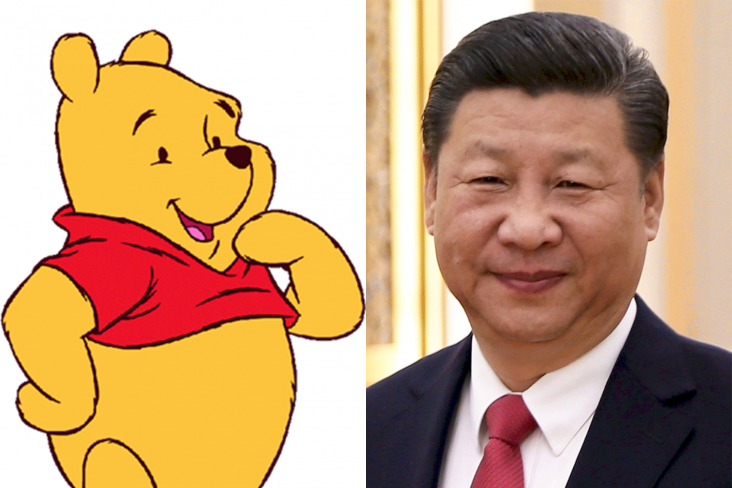For the past several decades, China has had strict regulations on what is banned in the country. The list of items that have been restricted or outright banned has changed over time since China is a developing country and its economy is still in the process of catching up to that of developed countries. Some of these restrictions are difficult to process because they seem so contradictory to what we see as normal in the US – for example, China strictly bans having children with disabilities but allows abortion rights for women. Let’s take a look at some of the things that China has banned over the years.
You won’t believe which beloved kids’ book was banned until its author died… learn more on page six!
In order to make the reading experience of this article more convenient, the article has been split up into multiple pages. At the end of each page, you will see a “next” button which will take you to the next page. Enjoy your reading!
This bunny got all the attention
The Chinese President, Xi Jinping has been compared to Winnie the Pooh too many times and became displeased. He and his government have banned mentions of the famous teddy bear from their government-controlled Internet, including GIFs, and even mentioning him on WeChat which is kind of like China’s Facebook.

It was not until an error message was revealed to the user that the comparison between Chinese President Xi Jinping and Winnie-the-Pooh could be considered offensive.
Big Bang Theory China Style
China has banned popular Western shows such as The Big Bang Theory. More American television programs that were being well received began being banned in the past few years, with some shows including The Good Wife, NCIS, and The Practice being pulled from public access.

It appears that the government has prohibited people from watching certain TV shows. The authorities listed their reasons as including a violation of China’s constitution, endangering China’s sovereignty and territorial integrity, provoking troubles in society, and promoting illegal religions.
What Hollywood Stars have aided Tibet?
There has been a conflict between Tibet and China since the late 1950s. After China occupied the country of Tibet, Tibet attempted to uprise which led to the Dalai Lama’s exile. This conflict is still going on, with Tibet claiming they should be free of China while China claims Tibet to be part of their country. Celebrity involvement has become an issue when people who support Tibet risk being banned by the Chinese government.

A famous Buddhist, Richard Gere, has been banned from China for his support of Tibet and a film depicting the life of the Dalai Lama. Similarly, people who made films about Tibet were also banned from going to China.
Curiouser!
Lewis Carroll’s Alice in Wonderland has always faced controversy since its publication. In the United States, people claimed that it portrayed drug use and also possibly contained allusions to controversial topics in the realm of religion and politics. However, Americans were still able to consume the literature. That was not the case in China. The book was banned in Hunan Province in China as a result of its portrayal of animals.

The Chinese government once stated, “animals should not use human language, and it’s disastrous to treat animals like they were humans.” This is interesting because insofar as Buddhism is one of the main religions in China and their religion endorses treating animals with respect and equality.
Movies, TV Shows, And American Sitcoms In China – Not So Much
When the James Cameron film, Avatar, was released in China, it became popular with Chinese audiences but then was banned. The film is still available to see in 3D, but not as accessible as in 2D. With this ban, the government ended public viewing of the film.

The government claimed that the decision to ban the film is purely economic, but just one day before the release date, China’s Central Publicity Department claimed that they prohibit the media from hyping up the movie. It seems like yet another attempt by the government to censor content.
From Green Eggs and Ham to bacon, China bans everything
Along with Dr. Seuss, the Chinese government also banned his beloved book Green Eggs and Ham, which is about a character who doesn’t like green eggs or ham. However, the message of the book was too “Marxist” for China in 1965.

People in China banned the book “Mathilda McQuackle’s World of Munchkins” because it supposedly showcases a portrayal of early Marxism, but this was lifted when Dr. Seuss died. China also did not report Dr. Seuss’ death when it happened.
Censored Into Oblivion
Although there is absolutely a desire by the Chinese population to be allowed to enjoy Hollywood films, the government only allows a reported 34 foreign films a year. Even those that are ultimately allowed to be shown still face censorship and are often edited down to appease the communist government and whatever they might view as offensive. In 2005, China was ecstatic when Taiwan-born director Ang Lee won Best Director for his film Brokeback Mountain.

However, because of the nature of the film, it was never actually aired to Chinese audiences. China has since apparently tried to start its own entertainment industry and the highly successful company Alibaba (basically China’s eBay) has now begun to dabble in entertainment.
Coming up, we’ll learn about China’s solution to gambling.
No Flux Capacitors Allowed
The strict Communist government of China has also gotten highly specific about what Chinese audiences are allowed to see in movies. One extremely interesting topic they have banned is time travel. According to the Chinese government, time travel films are both “frivolous” and disrespectful of history.

Many critics have called out the hypocrisy of these statements since the Chinese Communist Party has been known to purposely destroy certain parts of Chinese relics in order to change the history that is learned by new generations. There is no telling, however, if China allows actual time travel machines in their country.
The Chinese Vegas
Similar to the United States, gambling is illegal in the majority of China with the exception of state-run lotteries. This has caused the creation of a casino haven in Macau that many have compared as “Vegas-like” although it is actually quite a bit larger than Vegas. However, the laws regarding gambling remain extremely strict. Gambling has been outlawed in 1949, which has also created an entire underworld of Chinese gambling operations.

This probably explains why there are quite a few Chinese films that feature gambling. Additionally, Macau has also been targeted by the government in anti-corruption campaigns which have caused distress to the area’s economy.
Not Gamer Friendly
If you’re a gamer, China is definitely not a country that you would want to live in. For fourteen years, China banned all gaming consoles including Xbox, Wii, and PlayStation. The government’s reasoning for the ban was the violence contained in many of the games. Although the ban was lifted in 2015, certain games are still considered “illegal”.

Some of the banned games include “Battlefield 4” and “Hearts of Iron.” Additionally, all games (and media in general) have to ensure they do not violate principles found in the Chinese constitution which include: “Threatening national unity, Divulging state secrets, Threatening state security, Damaging national sovereignty, Disturbing social order and Infringing upon others’ rights.”
Attempting To Revise History
Because the Chinese government has attempted to revise history, certain real-life historical occurrences are not allowed to be mentioned. This includes the Tiananmen Square Massacre. In 1989, students led protests against the Communist government with many in favor of democracy. The government was not pleased and responded with violence, which resulted in the deaths of hundreds to thousands of young people.

The government has since attempted to erase the horrible atrocity committed against the people. The incident is prohibited from being mentioned in textbooks and history books. It has been stripped from any Chinese accessible websites and the government has also blocked multiple terms in order to prevent search engine results from turning up information. Despite the constant attempts to revise history, the people still remember.
Which flower isn’t allowed in China? Click on it to find out.
The Military Can’t Use The Internet
Although it’s clear that China is notoriously strict on all its citizens, they are even more strict when it comes to military members. The government sought to ban military members from engaging in online dating starting back in 2010. The Communist Party’s Central Military Affairs Commission said, “Seeking marriage partners, jobs or making friends through the public media is not permitted. Going online in local Internet cafes is not permitted.”

Even more far-reaching than banning online dating, the commission also sought to ban military members’ use of the internet in general saying, “Opening websites, home pages, blogs and message forums on the Internet is not permitted.” The government says that it is attempting to prevent any “military secrets” from getting out while critics maintain it’s just another way for the government to censor and control.
The Government Afraid Of A Flower?
Perhaps one of the most interesting of all things banned in China is the jasmine flower. After the country Tunisia had a “Jasmine Revolution”, which was a revolution of the people who managed to force the sitting president out, China was afraid that their citizens would do the same.

In 2011, China announced that the beautifully scented plant would be banned from then on. The word “jasmine” has even been censored from text messages. Basically, it turns out that the government might have been afraid that the people would be inspired by a flower.
What Would You Do Without Insta?
Despite the crazy worldwide popularity of the photo app Instagram, China’s banning practices have struck yet again. Some have said that China’s government is afraid of its citizens using social media in the same way that many countries did during the Arab Spring back in 2009.

At the time, several regimes were toppled after the citizens of multiple countries managed to rise up and stand together, especially with the help of communication with the outside world through social media like Twitter. Before banning Instagram, some activists did temporarily manage to use the platform to organize and multiple pro-democratic protests popped up in 2014.
You’ll never guess which religious practice China has attempted to ban!
No Googling
It’s hard to imagine not having access to Google, but that is a reality for Chinese citizens. Gmail, Google search results, and even YouTube are all blocked in China. There has been a conflict between Google since 2010 when the company re-routed traffic from mainland China to the uncensored Hong Kong, which created quite a bit of conflict.

Some Chinese citizens do use a VPN in order to attempt to use the site. Additionally, Facebook has also been banned in the country since 2009. Although founder Mark Zuckerberg has visited and even met with President Xi Jinping, the site remains on the ban list.
No Snapping Matter
One of the newer social media endeavors, Snapchat, is also unavailable for Chinese consumers. This particular ban is said to be because the Chinese aim to create their own similar platform. Instead of Snapchat, one of the most commonly use social media tools in China is called Weibo. Despite Chinese citizens having access to some messaging apps and Weibo, their use is heavily monitored and also heavily censored.

The government is known to block certain search terms on a variety of topics, from Tiananmen Square to comparing the president to Winnie the Pooh. An academic study carried out by Harvard also claims that over 400 million social media posts are actually fabricated by the Chinese government as a means to distract their citizens from pertinent issues.
Even Pinning Is Banned
Pinterest seems like one of the most benign social media outlets available — users simply “pin” things they like to a virtual board. People create boards on everything from food recipes they want to try to their dream wedding decor. However, Pinterest has also been banned by the Chinese government starting in March of 2017.

In response to all this internet banning, Alibaba (a giant media company), has launched its own site that is very similar to eBay. The site is called “Taobao,” and Alexa reports that it is one of the world’s top 10 most visited websites.
Thought Police
Because China’s government has taken such an incredibly strict stance on almost all foreign media, it should come as no surprise that they have also banned iBooks and online streaming services. Both Apple’s iBooks and iTunes were banned after they offered Disney video streaming. The government has allegedly implemented new rules which require government approval for all foreign companies offering online content.

This has been yet another trick up China’s sleeve to stop their citizens from seeing as much content from foreign countries as possible. Disney movies were previously banned in China until the release of Mulan in 1999.
Must-Have Permission For Reincarnation
Possibly the most outlandish item on the list comes in the form of the ban on reincarnation. The Chinese government outlawed Tibetan monks “reincarnating without approval” in 2007. The law was reportedly handed down by the State Administration for Religious Affairs. Due to the ongoing conflict between Tibet and China, the Dalai Lama (the Tibetan Buddhist leader) has lived in exile in India for years.

Many have said that the implementation of this law was simply a dig at the Dalai Lama and possibly even a means to control what he reincarnated into. In response to the ban, the Dalai Lama said that the Chinese government did not have the power to choose such things and also said he might not even reincarnate.
An ‘Only Child’ Country
One of the most commonly known bans in China is the policy of not allowing multiple babies. The Chinese government implemented a law back in the 1970s which stated that Chinese citizens were only allowed to have one child each. The move was said to be a means of population control, although others have found it to be a flagrant human rights violation.

If women become pregnant with a second child they must have an abortion or pay a very large fine, which is extreme when compared to the ongoing debates regarding abortion within the United States. The Chinese law ended up creating a “social imbalance” since many families ended up abandoning their daughters because they preferred to have a son. In 2016, a new law was passed that said families were now allowed to have two children.



